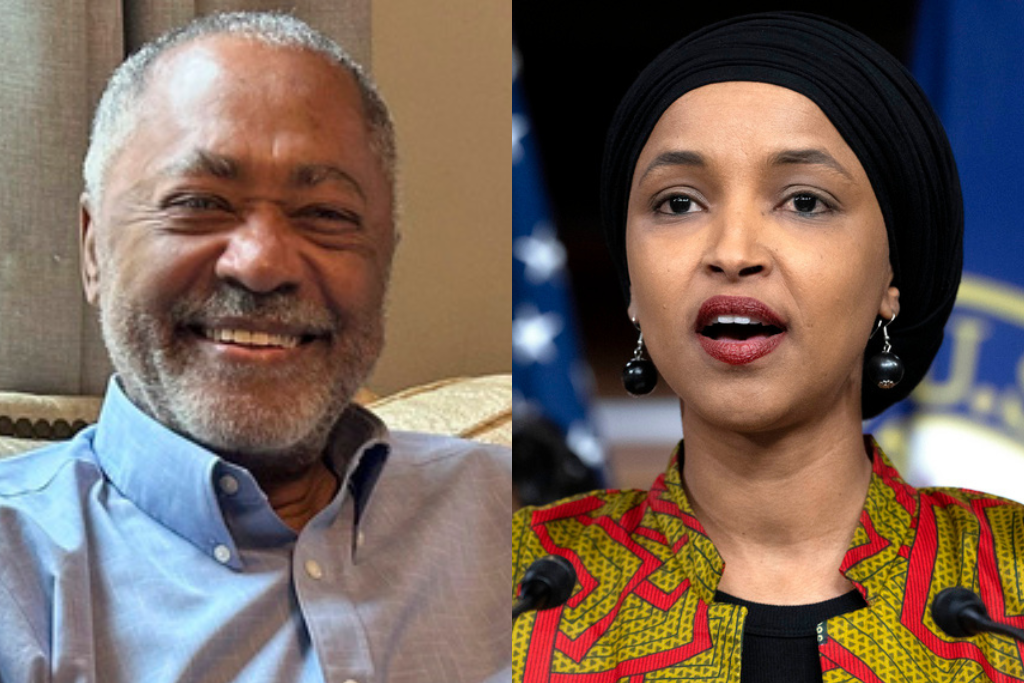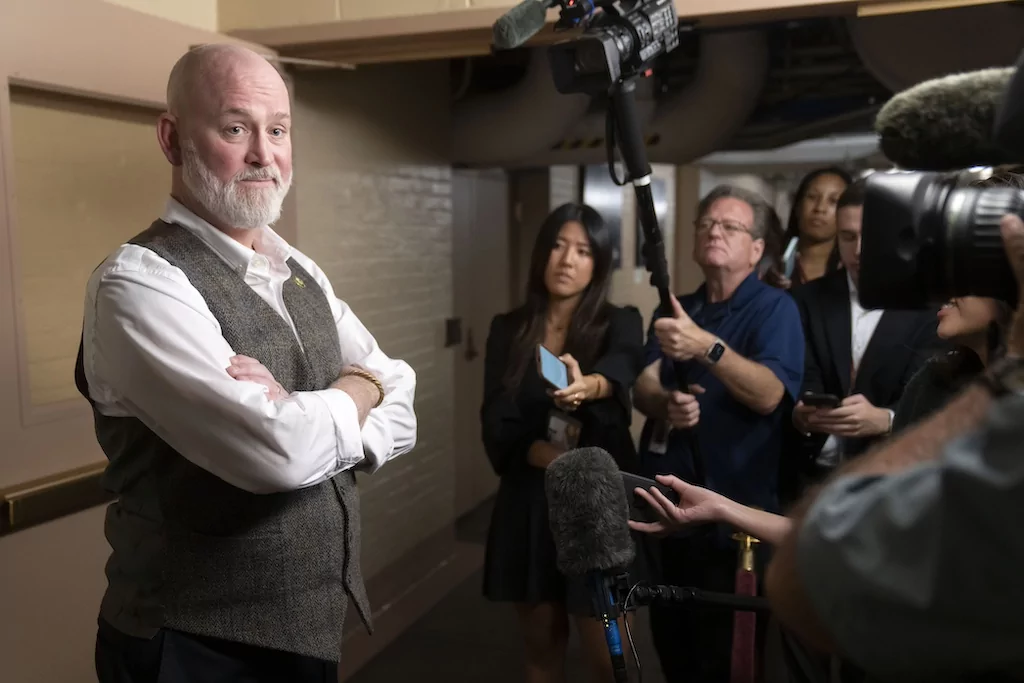
Primaries in Minnesota, Vermont, Connecticut, and Wisconsin Tuesday evening proved to be a good night for incumbents.
Progressive “Squad” Rep. Ilhan Omar (D-MN) survived a Democratic primary challenge in Minnesota’s 5th Congressional District, in a positive sign for the beleaguered far-left. Sen. Amy Klobuchar (D-MN) easily fended off four Democratic primary challengers.
In the last primary before the Democratic National Convention begins next week, several Senate matchups were decided as Republicans fight to flip the upper chamber away from Democrats.
Here are the Washington Examiner‘s top takeaways from Tuesday’s primaries.
Ilhan Omar survives primary challenge

Nearly two hours after polls closed in Minnesota the Associated Press called the Democratic primary in Omar’s favor.
The Minnesota congresswoman defeated former Minneapolis City Council member Don Samuels for the second time after the two faced off during the 2022 midterms. With 99% of votes counted, Omar received 56.2% compared to Samuels’s 42.9%. This was a more decisive victory than in 2022 when she beat Samuels by only two percentage points.
Omar’s win Tuesday prevented her from the same fate as two of her fellow “Squad” members, Reps. Cori Bush (D-MO) and Jamaal Bowman (D-NY), who lost their primaries after AIPAC poured millions of dollars to oust them from Congress due to their anti-Israel rhetoric. Samuels sought to make Israel a focus in his race against Omar but was unsuccessful in ousting her.
Omar will likely win the election in November against Republican candidate Dalia al Aqidi, securing a fourth term in Congress.
Several Senate races are set

A slew of Senate matchups were finalized Tuesday evening setting up a November showdown. Sen. Bernie Sanders ran uncontested in the Democratic Senate primary in Vermont. He will face Republican Gerald Malloy, who also ran uncontested, in the GOP primary.
In battleground Wisconsin, Democratic Sen. Tammy Baldwin will take on Republican businessman Eric Holvde in a race that will decide if Democrats will retain their majority in the Senate or if the GOP can snatch back control. Hovde, who has the backing of former President Donald Trump, defeated Charles Barman and Rejani Raveendran, as was expected. The Cook Political Report rates the Wisconsin Senate race as “leans Democratic.”
Sen. Chris Murphy (D-CT) ran unopposed in the Democratic Senate primary. He is set to run against Republican Matthew Corey, who defeated Gerry Smith in the GOP primary. The seat however is a safe bet for Democrats.
In Minnesota, Sen. Amy Klobuchar (D) will run against Republican and former NBA player Royce White, a Trump supporter. The race is not considered one of the most competitive battlegrounds that will determine control of the Senate.
Democrats decide on Gov. Phil Scott challenger
Republican Gov. Phil Scott (VT) will face Democrat Esther Charlestin as he hopes to win a fifth term in office and become the first state governor since Howard Dean to serve more than four terms.
Charlestin, a former Middlebury school administrator, defeated fellow Democrat Peter Duval by more than double digits according to the Associated Press. With just 98% of the ballots counted, Charlestin won nearly 72% of the vote compared to Duval’s 28%.
Democrats are cautiously hopeful they can flip to race due to the state’s heavily Democratic leanings. But Scott was a critic of Trump going so far as to endorse his rival Nikki Haley in the GOP presidential primary. Scott claimed he voted for President Joe Biden during the 2020 election. Scott was also the nation’s most popular governor, according to a Morning Consult survey. The Cook Political Report rates the race as “Solid Republican.”
Progressive Party candidate Marielle Blais and at least two independents, June Goodband and Poa Mutino, will also be on the November ballot.
Rep. Derrick Van Orden gets a Democratic challenger

Rep. Derrick Van Orden (R-WI) is a Trump supporter who attended the Jan. 6, 2021 “stop the steal” rally before rioters stormed the U.S. Capitol. Democrat Rebecca Cooke, who won the primary for the 3rd district is hoping to unseat Van Orden in November.
Cooke, a small business owner, defeated Eric Wilson and state Rep. Katrina Shankland in the primary after garnering 49.1% of the vote with 90% of ballots tallied. Cooke had the backing of Blue Dogs and New Democrats while Democratic Reps. Mark Pocan and Gwen Moore backed Shankland. This is Cooke’s second time running for the seat after losing the Democratic primary in 2022 to state Sen. Brad Pfaff.
Van Orden narrowly won the seat in 2022, taking the seat from Democratic hands for the first time in more than 25 years.
The Democratic Congressional Campaign Committee listed Van Orden on its “districts in play” list and has blasted the congressman’s controversial moments such as cursing at Senate pages in its attempts to unseat him.
Republican select challenger to Rep. Jim Himes
Republicans chose physician and attorney Michael Goldstein to take on longtime Rep. Jim Himes (D-CT), who represents Connecticut’s 4th Congressional District, in November.
Goldstein defeated Bob MacGuffie, a corporate insurance executive, 53% to 47%, with 96% of votes counted, according to the Associated Press.
Should Himes prevail in the fall, and he is expected to, it would make a ninth term in Congress. The Connecticut Democrat already has the financial advantage against the GOP. He had $2.3 million in cash on hand at the end of June, compared to $98,366 for Goldstein as of July 24, according to the Associated Press.
Wisconsinites reject ballot questions to limit the governor’s ability to spend federal funds
Wisconsin voters rejected ballot questions from Republicans that would have curtailed the governor’s ability to use federal funds on disaster relief and given state legislators more power in how the money was spent.
The losses were a win for Democrats, as Gov. Tony Evers (D) and liberals had organized Wisconsinites to vote no on the questions. Republicans argued that it would have given more oversight over how the governor spends funding after Evers’s handling of billions of dollars in COVID-19 federal relief money.
Evers was allowed to spend the pandemic funds in whichever way he decided, to the anger of the GOP who wanted the state legislature to have oversight. With voters rejecting the questions, Evers will be allowed to spend federal funds without the legislature’s approval.







